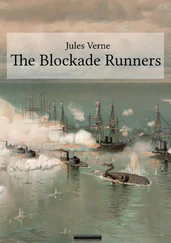“Deuce take it,” said Bolton, cheerfully; “I don't know why it just occurs to me that in Water Street there's a comfortable tavern, where one might be very well off between a glass of gin and a bottle of porter. Can you see it from here, Gripper?”
“To tell the truth,” answered the sailor who had been addressed, and who generally pretended to be very sullen, “I must say I can't see it from here.”
“That's merely your way of talking, Gripper; it is evident that, in those snow towns which Dr. Clawbonny is always admiring, there's no tavern where a poor sailor can moisten his throat with a drink or two of brandy.”
“You may be sure of that, Bolton; and you might add that on board of this ship there's no way of getting properly refreshed. A strange idea, sending people into the northern seas, and giving them nothing to drink!”
“Well,” answered Garry, “have you forgotten, Gripper, what the doctor said? One must go without spirits if he expects to escape the scurvy, remain in good health, and sail far.”
“I don't care to sail far, Garry; and I think it's enough to have come as far as this, and to try to get through here where the Devil does n't mean to let us through.”
“Well, we sha' n't get through,” retorted Pen. “0, when I think I have already forgotten how gin tastes!”
“But,” said Bolton, “remember what the doctor said.”
“0,” answered Pen, with his rough voice, “that's all very well to say! I fancy that they are economizing it under the pretext of saving our health.”
“Perhaps that devil Pen is right,” said Gripper.
“Come, come!” replied Bolton, “his nose is too red for that; and if a little abstinence should make it a trifle paler. Pen won't need to be pitied.”
“Don't trouble yourself about my nose,” was the answer, for Pen was rather vexed. “My nose does n't need your advice; it does n't ask for it; you'd better mind your own business.”
“Come, don't be angry, Pen; I did n't think your nose was so tender. I should be as glad as any one else to have a glass of whiskey, especially on such a cold day; but if in the long run it does more harm than good, why, I'm very willing to get along without it.”
“You may get along without it,” said Warren, the stoker, who had joined them, “but it's not everybody on board who gets along without it.”
“What do you mean, Warren?” asked Garry, looking at him intently.
“I mean that for one purpose or another there is liquor aboard, and I fancy that aft they don't get on without it.”
“What do you know about it?” asked Garry.
Warren could not answer; he spoke for the sake of speaking.
“You see, Garry,” continued Bolton, “that Warren knows nothing about it.”
“Well,” said Pen, “we'll ask the commander for a ration of gin; we deserve it, and we'll see what he'll say.”
“I advise you not to,” said Garry.
“Why not?” cried Pen and Gripper.
“Because the commander will refuse it. You knew what the conditions were when you shipped; you ought to think of that now.”
“Besides,” said Bolton, who was not averse to taking Garry's side, for he liked him, “Richard Shandon is not master; he's under orders like the rest of us.”
“Whose orders?” asked Pen.
“The captain's.”
“Ah, that ridiculous captain's!” cried Pen. “Don't you know there's no more captain than there is tavern on the ice? That's a mean way of refusing politely what we ask for.”
“But there is a captain,” persisted Bolton; “and I'll wager two months' pay that we shall see him before long.”
“All right!” said Pen; “I should like to give him a piece of my mind.”
“Who's talking about the captain?” said a new speaker.
It was Clifton, who was inclined to be superstitious and envious at the same time.
“Is there any news about the captain?” he asked.
“No,” a single voice answered.
“Well, I expect to find him settled in his cabin some fine morning, and without any one's knowing how or whence he came aboard.”
“Nonsense!” answered Bolton; “you imagine, Clifton, that he's an imp, a hobgoblin such as are seen in the Scotch Highlands.”
“Laugh if you want to, Bolton; that won't alter my opinion. Every day as I pass the cabin I peep in through the keyhole, and one of these days I'll tell you what he looks like, and how he's made.”
“0, the devil!” said Pen; “he'll look like everybody else. And if he wants to lead us where we don't want to go, we'll let him know what we think about it.”
“All right,” said Bolton; “Pen does n't know him, and wants to quarrel with him already.”
“Who does n't know all about him'?” asked Clifton, with the air of a man who has the whole story at his tongue's end; “I should like to know who does n't.”
“What do you mean?” asked Gripper.
“I know very well what I mean.”
“But we don't.”
“Well, Pen has already had trouble with him.”
“With the captain?”
“Yes, the dog-captain; for it's the same thing precisely.”
The sailors gazed at one another, incapable of replying.
“Dog or man,” muttered Pen, between his teeth, “I'll bet he'll get his account settled one of these days.”
“Why, Clifton,” asked Bolton, seriously, “do you imagine, as Johnson said in joke, that that dog is the real captain?”
“Certainly, I do,” answered Clifton, with some warmth; “and if you had watched him as carefully as I have, you'd have noticed his strange ways.”
“What ways? Tell us.”
“Have n't you noticed the way he walks up and down the poop-deck as if he commanded the ship, keeping his eye on the sails as if he were on watch?”
“That's so,” said Gripper; “and one evening I found him with his paws on the wheel.”
“Impossible!” said Bolton.
“And then,” continued Clifton, “does n't he run out at night on the ice-fields without caring for the bears or the cold?”
“That's true,” said Bolton.
“Did you ever see him making up to the men like an honest dog, or hanging around the kitchen, and following the cook when he's carrying a savory dish to the officers? Have n't you all heard him at night, when he's run two or three miles away from the vessel, howling so that he makes your blood run cold, and that's not easy in weather like this? Did you ever seen him eat anything? He never takes a morsel from any one; he never touches the food that's given him, and, unless some one on board feeds him secretly, I can say he lives without eating. Now, if that's not strange, I'm no better than a beast myself.”
“Upon my word,” answered Bell, the carpenter, who had heard all of Clifton's speech, “it may be so.”
But all the other sailors were silent.
“Well, as for me,” continued Clifton, “I can say that if you don't believe, there are wiser people on board who don't seem so sure.”
“Do you mean the mate?” asked Bolton.
“Yes, the mate and the doctor.”
“Do you think they fancy the same thing?”
“I have heard them talking about it, and they could make no more out of it than we can; they imagined a thousand things which did not satisfy them in the least.”
“Did they say the same things about the dog that you did, Clifton?” asked the carpenter.
“If they were not talking about the dog,” answered Clifton, who was fairly cornered, “they were talking about the captain; it's exactly the same thing, and they confessed it was all very strange.”
“Well, my friends,” said Bell, “do you want to hear my opinion?”
“What is it!” they all cried.
“It is that there is not, and there will not be, any other captain than Richard Shandon.”
Читать дальше












